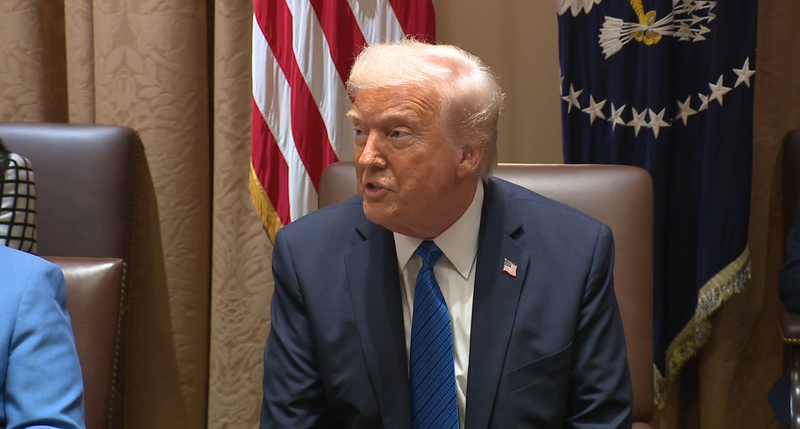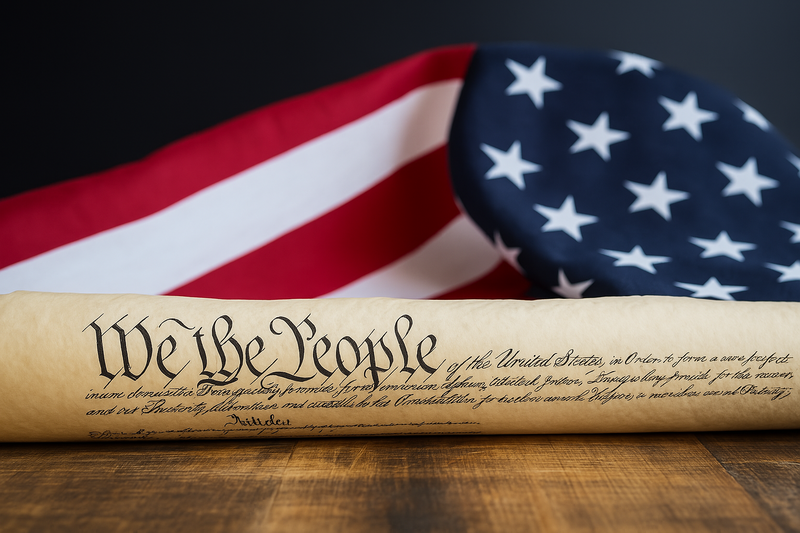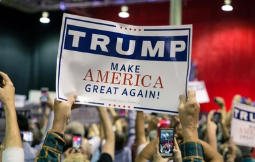Trump’s Third-Term Tease: A Constitutional Crisis or Political Theater?
Input
Modified
A Shockwave Through Washington The 22nd Amendment and the Limits of Power Stoking the Base, Shaking the System

A Shockwave Through Washington
The political world is no stranger to Donald Trump’s unconventional strategies and bombastic rhetoric. From his unexpected rise to the presidency in 2016 to his constant presence in the media since leaving office, Trump has remained a polarizing figure. Now, Trump has raised the stakes even higher by publicly suggesting that he is considering ways to serve a third term as president. While the 22nd Amendment to the U.S. Constitution places a limit of two terms for any president, Trump’s comments have sparked a firestorm of debate across the nation. For many, this idea is not just a surprise—it's a move that will undoubtedly scare Democrats and further fuel the ongoing political divide.
Trump’s statements about potentially seeking a third term are sure to cause waves within the American political landscape. The very idea of a third term, especially for a figure as contentious as Trump, challenges not only the constitutional framework but also the political norms of the nation. The thought of him returning to the White House is enough to send a jolt of fear through Democrats and left-wing supporters, many of whom are still grappling with the effects of his previous presidency. But the real question is: how serious is Trump about this third-term bid, and what would it mean for the future of American democracy?
Trump’s comments have been anything but ambiguous. He has made it clear that he is not joking about the possibility of serving a third term. In fact, he has said that there are "methods" available for him to seek a third term, a statement that has only added fuel to the fire. Trump, known for pushing the boundaries of what’s politically and legally acceptable, seems to be once again testing the waters for an unprecedented move. While many legal experts dismiss the possibility of Trump serving a third term due to the 22nd Amendment, the former president’s words are not easily ignored, especially when they come from someone with such an outsized influence in American politics.
For Democrats, the notion of Trump returning to the White House for a third term is nothing short of a nightmare. After years of fighting his policies and battling his administration’s controversial actions, the idea of another Trump presidency is enough to spark a renewed sense of dread. Trump’s first term was marked by significant division within the country, with clashes over immigration, foreign policy, and race relations. His second term, had it happened, would likely have intensified these issues even further. His influence on the Republican Party, coupled with his unwavering base of support, means that a third term could be a real possibility, at least in the minds of his followers.
Democrats and left-wing supporters have already begun raising their voices in protest, fearing that Trump’s pursuit of a third term could lead to a fundamental shift in American governance. Trump has repeatedly signaled his discontent with the political establishment and has used his influence to rally his base against what he perceives as an overreaching government. His comments about a third term have only intensified the discussions surrounding his eligibility and what it means for the future of the United States. While many argue that such a move is unconstitutional, others are left wondering whether Trump’s continued political maneuvering could chip away at the very foundations of American democracy.

The 22nd Amendment and the Limits of Power
The debate over Trump’s potential third term is not new. Back in February, the discussion began to gain traction after Trump hinted at the possibility of seeking another term in office. At the time, the idea was brushed off by many as just another example of Trump’s penchant for dramatic statements. However, now that he has publicly reaffirmed his interest in a third term, the conversation has shifted from a mere curiosity to a serious political issue. Legal scholars and political commentators are once again delving into the intricacies of the 22nd Amendment and whether Trump could find a loophole that would allow him to serve another four years.
While it may seem unlikely that Trump could circumvent the 22nd Amendment’s restrictions, his track record of challenging established norms cannot be ignored. He has already shown a willingness to flout convention, whether it’s through his controversial executive orders or his unorthodox approach to governance. Trump has never been one to play by the rules, and his third-term remarks may be part of a broader strategy to keep his name in the political conversation. By raising the prospect of a third term, Trump is not only generating headlines but also positioning himself as the center of attention in a race that has yet to officially begin.

Stoking the Base, Shaking the System
What’s most intriguing about Trump’s talk of a third term is that it reflects his unyielding desire to maintain political relevance. Even after losing the 2020 election to Joe Biden, Trump has remained a dominant figure within the Republican Party. His influence over the party’s direction is undeniable, with many GOP leaders still aligning themselves with his policies and rhetoric. This continued sway over the political landscape has only emboldened him, giving him the confidence to make such bold claims about his future in office. For Trump, it seems that the prospect of returning to the presidency is not just about personal ambition—it's about maintaining control over the political discourse and ensuring that he remains a key figure on the national stage.
The idea of Trump running for a third term also serves as a reminder of the unique political dynamics that have emerged in recent years. Since his election in 2016, Trump has continually tested the boundaries of American democracy, pushing back against norms and traditions that have long governed the country’s political system. His presidency was defined by an unorthodox approach to governance, one that prioritized populism and direct appeal to voters over traditional political processes. His comments about a third term are a natural extension of this mindset, signaling that he is not done shaping the course of American politics.
In the coming months and years, the debate over Trump’s eligibility for a third term will likely continue to resurface. As we approach the 2024 election, the question of whether Trump can legally run for president again will remain a hot-button issue. While his third-term talk may be dismissed by some as a publicity stunt, others will undoubtedly take it more seriously. Legal challenges, media scrutiny, and continued public discourse will keep this issue in the spotlight, ensuring that it remains a source of political tension and division.
For Trump’s supporters, the idea of him serving a third term represents a continuation of the populist revolution that began in 2016. For his detractors, however, it is a terrifying prospect that threatens to undermine the very principles of democracy. Regardless of one’s political allegiance, Trump’s third-term remarks have undoubtedly struck a nerve, and the issue is unlikely to fade away any time soon.
As Trump continues to tease the possibility of a third term, it becomes increasingly clear that this is a conversation that will not die down quietly. Whether or not Trump can find a way to serve a third term remains to be seen, but one thing is certain: his influence on American politics will continue to shape the national discourse for years to come. With his base still firmly behind him, and the political landscape as divided as ever, the question of whether Donald Trump will return to the White House remains an open one—and it’s a question that will likely keep Americans on edge for the foreseeable future.





















